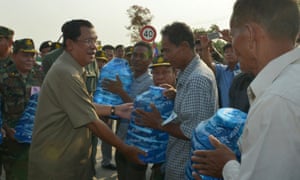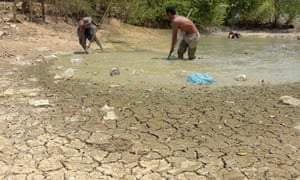May 06, 2016 6:44 PM
Seventeen-year-old Jordan Pisey Windle has come a long way since he
was orphaned as a baby in Cambodia's rural Prey Veng province.
The eight-time junior national diving champion and five-time U.S. national champion is poised to make it to the 2016 Summer Olympics in Rio de Janeiro, Brazil.
But first, he has to make another important journey — back to the country of his birth.
A long road
Jordan, at age 7, was discovered to have a natural talent at a summer camp at the Swimming and Diving Hall of Fame in Fort Lauderdale, Florida. By age 12, he won the U.S. Junior National Championship, diving from a 10-meter platform. A short time later, he won gold at the Junior Pan American Championships in Arizona, followed by silver and bronze medals at the U.S. National Championships.
"What we want to share with the people is that his success was really born in his birthplace, in his homeland in Cambodia," Jerry Windle, Jordan's adoptive father, told VOA Khmer. "We were able to let him develop that, by just giving him certain opportunities."
Jerry Windle, an American who adopted Jordan as a single parent in June 2000, is now preparing to take his teenage son on his first trip back to Cambodia — along with Jerry's partner, Andrés Rodriguez.
"I wanted to wait specifically until he is a teenager to make his first homecoming trip, so that he would be able to, from an emotional and intellectual perspective, embrace everything this trip means," Jerry Windle said.
"I feel very honored to go back, because I haven't been back since I was adopted," Jordan told VOA Khmer, speaking by phone from California, where he was traveling with his dive team. He says he plans to meet Cambodian orphans like himself.
"My message would be that I was the same as them — an orphan. Luckily, I got adopted, and I am doing really well in my life," he said. "But my message would be that, if you are given a chance — like a little chance, nothing major — you can work from that and achieve something great and show people that you can do well in life."
Scheduled to meet King Norodom Sihamoni and Cambodian government officials during the visit, Jordan also plans to hold a diving exhibition to showcase his talent, hoping it will inspire Cambodian youth.
While Jordan doesn't speak Khmer, his father says he was exposed to Khmer culture and history through art and storytelling as a child, and he studied the country's brutal Khmer Rouge era in school.
Life with two fathers
Born in Prey Veng province, Jordan was placed in an orphanage in Phnom Penh as an infant after his parents passed away. Jerry Windle, a former U.S. Navy officer who had served off Cambodia's coast, adopted the boy around age 2 — a process that took about five months.
When they met, Jordan had a picture Windle had sent him hanging around his neck. The young orphan had affixed a picture of himself to the opposite side.
"When the nanny handed me Jordan for the first time, Jordan had that photograph of us around his neck, and that was a very special connection that I had for the first time with him," Windle recalled.
For Jordan, the experience of being brought up by two fathers has made him a champion of diversity.
Rigorous training
From Tim O'Brien to Evan Linette and Greg Louganis, Jordan has been trained by renowned divers. At the age of 12, he became the youngest diver ever to qualify for the U.S. Olympics trials.
"Physiologically, his body shape and makeup is very optimal for diving," said Windle, who is quick to point out that it's not all about being fiercely competitive.
"He really, really enjoys being around the water; swimming and playing in it," he added. "It became very natural for him to want to be able to flip and twist off the diving board."
Out of the water, Jordan stays focused on his education, taking classes online with the International Connections Academy. He is expected to graduate from high school at the end of this year, and plans to attend college in early 2017.
"He really is an American citizen today," said Windle, reflecting on everything that's brought the family this far. "But the truth is, he is a child of Cambodia, and Cambodia is his home country, and he embraces that."
This report was produced in collaboration with VOA's Khmer service.
The eight-time junior national diving champion and five-time U.S. national champion is poised to make it to the 2016 Summer Olympics in Rio de Janeiro, Brazil.
But first, he has to make another important journey — back to the country of his birth.
A long road
Jordan, at age 7, was discovered to have a natural talent at a summer camp at the Swimming and Diving Hall of Fame in Fort Lauderdale, Florida. By age 12, he won the U.S. Junior National Championship, diving from a 10-meter platform. A short time later, he won gold at the Junior Pan American Championships in Arizona, followed by silver and bronze medals at the U.S. National Championships.
FILE
- A Buddhist monk blesses 2-year-old Jordan Pisey Windle before he left
his homeland to join his father, Jerry Windle, in Florida, United
States.
Now ranked in the top five American divers, Jordan is focused on next month's qualifying trials for the 2016 Summer Games."What we want to share with the people is that his success was really born in his birthplace, in his homeland in Cambodia," Jerry Windle, Jordan's adoptive father, told VOA Khmer. "We were able to let him develop that, by just giving him certain opportunities."
Jerry Windle, an American who adopted Jordan as a single parent in June 2000, is now preparing to take his teenage son on his first trip back to Cambodia — along with Jerry's partner, Andrés Rodriguez.
"I wanted to wait specifically until he is a teenager to make his first homecoming trip, so that he would be able to, from an emotional and intellectual perspective, embrace everything this trip means," Jerry Windle said.
"I feel very honored to go back, because I haven't been back since I was adopted," Jordan told VOA Khmer, speaking by phone from California, where he was traveling with his dive team. He says he plans to meet Cambodian orphans like himself.
"My message would be that I was the same as them — an orphan. Luckily, I got adopted, and I am doing really well in my life," he said. "But my message would be that, if you are given a chance — like a little chance, nothing major — you can work from that and achieve something great and show people that you can do well in life."
Scheduled to meet King Norodom Sihamoni and Cambodian government officials during the visit, Jordan also plans to hold a diving exhibition to showcase his talent, hoping it will inspire Cambodian youth.
While Jordan doesn't speak Khmer, his father says he was exposed to Khmer culture and history through art and storytelling as a child, and he studied the country's brutal Khmer Rouge era in school.
Life with two fathers
Born in Prey Veng province, Jordan was placed in an orphanage in Phnom Penh as an infant after his parents passed away. Jerry Windle, a former U.S. Navy officer who had served off Cambodia's coast, adopted the boy around age 2 — a process that took about five months.
When they met, Jordan had a picture Windle had sent him hanging around his neck. The young orphan had affixed a picture of himself to the opposite side.
"When the nanny handed me Jordan for the first time, Jordan had that photograph of us around his neck, and that was a very special connection that I had for the first time with him," Windle recalled.
For Jordan, the experience of being brought up by two fathers has made him a champion of diversity.
FILE - Champion diver Jordan Pisey Windle poses for a picture with his two male parents, Jerry Windle and Andres Rodriguez.
"I love my dads more than anything in the world, and I wouldn't be
where I am today without them sacrificing so much," he said. "If you
want to have a family, and if you are a little different, I don't think
that changes anything as long as there are people supporting, caring and
loving you."Rigorous training
From Tim O'Brien to Evan Linette and Greg Louganis, Jordan has been trained by renowned divers. At the age of 12, he became the youngest diver ever to qualify for the U.S. Olympics trials.
"Physiologically, his body shape and makeup is very optimal for diving," said Windle, who is quick to point out that it's not all about being fiercely competitive.
"He really, really enjoys being around the water; swimming and playing in it," he added. "It became very natural for him to want to be able to flip and twist off the diving board."
Out of the water, Jordan stays focused on his education, taking classes online with the International Connections Academy. He is expected to graduate from high school at the end of this year, and plans to attend college in early 2017.
"He really is an American citizen today," said Windle, reflecting on everything that's brought the family this far. "But the truth is, he is a child of Cambodia, and Cambodia is his home country, and he embraces that."
This report was produced in collaboration with VOA's Khmer service.


